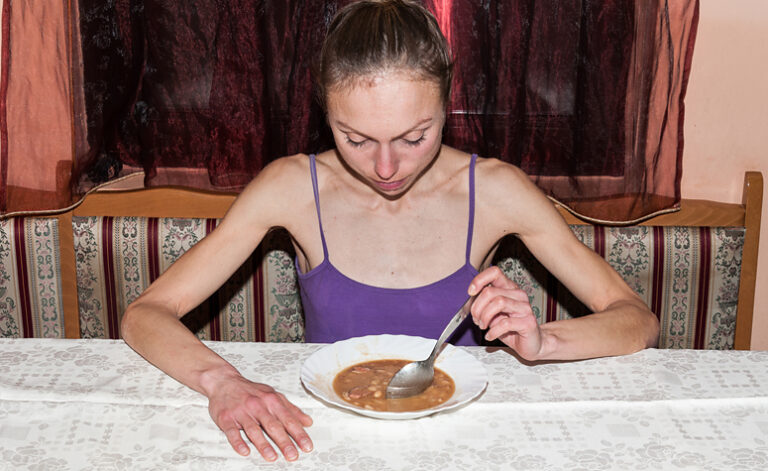Anorexia Treatment
Anorexia nervosa, or anorexia, is a complicated eating disorder that can potentially lead to death. It can cause a sufferer to have an irrational fear of gaining weight and a distorted body image. It can adversely affect a person’s physical and emotional health. Anorexia also negatively impacts relationships and the ability to function normally in everyday life.
In the UK, cases of anorexia have gone up over the last few years. Anyone can develop anorexia, irrespective of age, gender or background. However, a higher incidence is noted among adolescents and young adults, particularly in girls and young women. It is projected that up to 1 in 100 girls between the ages of 15 and 19 in the UK will have anorexia at some point in their lives.
These eating disorder statistics show the serious need to address anorexia. Early intervention and the availability of effective treatment options are of critical importance.
On this page we take a closer look at anorexia treatment in the UK, specifically private anorexia treatment options, to bring hope to people who need guidance and support.

Types of Anorexia
The conventional form of anorexia involves stringent limitations on food intake and a distorted body image. However, there are subtypes and related conditions.
- Restricting type
This is the familiar type of anorexia, where people extremely restrict the amount of food they eat and aggressively exercise to lose weight. They see themselves as overweight despite being underweight. - Binge eating/purging type
This involves a pattern of binge eating followed by purging to compensate for the excess calories consumed. Purging behaviours include induced vomiting and abuse of laxatives. This subtype of anorexia shares symptoms with bulimia nervosa.
Atypical anorexia
This form of anorexia shares the same psychological and behavioural symptoms as the restricting type, but the body weight of the person experiencing the disorder is in the average or above average range. People with this anorexia subtype have a fear of weight gain, a distorted body image and restrictive eating patterns but have regular or even large-sized bodies.Orthorexia
This is an eating disorder characterised by having an unhealthy obsession with healthy eating. People with this condition limit the food they eat to what they perceive as “pure” or “clean” to the exclusion of entire food groups. Orthorexia is not an official diagnosis, but many of its symptoms overlap with anorexia nervosa.
Identifying the different types of anorexia is essential to provide the appropriate treatment needed based on the specific eating disorder an individual is suffering from. This knowledge will enable healthcare providers to give personalised treatment that is more likely to yield good results.

Symptoms of Anorexia
Anorexia presents with a range of both physical and emotional symptoms. The degree of intensity can vary, but taken together, they emphasise the importance of providing immediate intervention and support.
Physical symptoms
- Significant weight loss
Sudden and substantial weight loss resulting in an unhealthy body weight that is considerably lower than the acceptable range for their age and height - Extreme thinness
A gaunt and appalling bony, almost skeletal appearance - Fatigue
Severe fatigue and an extreme feeling of weakness due to lack of nutrition - Dizziness and fainting
Lightheadedness which sometimes leads to fainting due to low blood pressure and electrolyte imbalances resulting from deficient food intake - Hair and nail problems
Hair may become brittle resulting in hair fall; nails may become brittle and discoloured, taking on a blue tinge - Gastrointestinal issues
Constipation, bloating and other digestive problems - Amenorrhoea
Women with anorexia may experience amenorrhea, a condition in which menstruation periods cease due to hormonal imbalance resulting from extreme weight loss - Reduced immunity
Increased vulnerability to prolonged bacterial, viral and fungal infections - Poor hygiene
The obsessive nature of the condition can cause people with anorexia to neglect their personal hygiene, often forgetting to wash or brush their teeth

Emotional and cognitive symptoms
- Intense fear of gaining weight
An irrational and extreme fear of weight gain even if the person is significantly underweight - Body image distortion
People with anorexia are convinced that they are fat even when presented with proof to the contrary - Anxiety and depression
The severe stress the condition has on the body exacerbates mental health issues such as anxiety and depression that many people with anorexia may already be suffering from - Social withdrawal
Distancing from social activities due to self-consciousness regarding their appearance or eating in the presence of others - Obsessive thoughts about food
Exaggerated fixation on food, calories, and meal planning - Secretive behaviour
Concealment of unhealthy eating habits such as hiding food, not being truthful about their food consumption, and hiding under oversized clothes in an attempt to disguise weight loss

Fast Access to Residential Treatment
We are currently able to offer fast access to private inpatient treatment.
Please call us today and speak to one of our expert advisors.
Call in confidence: 0800 0148 970
Anorexia Treatment Options
Treatment for complex eating disorders, including anorexia, often employs several approaches that address the specific needs of each individual. In the UK, the treatment guidelines set by the National Institute for Health and Care Excellence (NICE) serve as the standard for care. There are a several eating disorder treatment options and choosing the right one for your or your loved one will be subject to the severity of the illness.
Outpatient and inpatient treatment for anorexia
There are two main ways through which anorexia treatment is provided, namely, outpatient and inpatient services. If you don’t require 24-hour monitoring for your eating disorder, the outpatient service may be appropriate for you. It will allow you to receive care while living at home and maintaining your daily routines.
Inpatient treatment, on the other hand, is for people who need round-the-clock care in managing their eating disorder. This involves being admitted to one of our clinics or eating disorder specialist treatment centres to receive more intensive care.

Therapy types for anorexia
Eating disorder treatment may also be through therapy such as:
- Cognitive behavioural therapy for anorexia nervosa (CBT-E)
This is one of the most recommended evidence-based treatments for anorexia. This specialised form of cognitive behavioural therapy (CBT) involves addressing unhealthy beliefs and behaviours associated with anorexia.
- Maudsley Anorexia Nervosa Treatment for Adults (MANTRA),
Another practical approach is the Maudsley Anorexia Nervosa Treatment for Adults (MANTRA), which has some elements of CBT. It approaches the problem by delving into the underlying psychological and emotional issues that might be contributing to the eating disorder.
- Interpersonal therapy (IPT)
IPT focuses on addressing the interpersonal and emotional aspects of anorexia. The goal of IPT is to help you improve your relationships, communication skills and emotional regulation, all of which can help you lessen your binge-purge behaviours
- Specialist supportive clinical management (SSCM)
For adults suffering from severe and persistent anorexia, specialist supportive clinical management (SSCM) can be a suitable treatment approach. It aims to help people regain control by giving them consistent support and encouragement.
- Family-based treatment (FBT)
For young people, family-based treatment (FBT) has proved to be a highly effective form of treatment for anorexia. FBT involves family members in the therapy process, which aims to help a young individual with anorexia achieve a healthy weight and eating pattern.
Treatment for anorexia also includes nutritional counselling and medical monitoring. Selective serotonin uptake inhibitors (SSRIs) and other medications may be prescribed to address possible concurrent mental health problems. Additionally, acceptance and commitment (ACT) is also being looked into as a potential effective treatment for those suffering from anorexia.
It’s crucial to understand that the treatment must be appropriate to each person’s specific needs, and combining methods, including individual and group therapy, could be helpful. Ultimately, the decision on the treatment method to use should be made based on the recommendations of healthcare professionals and taking into consideration the person’s age, the severity of their case, and other details unique to their case.
Anorexia treatment goes beyond restoring the individual’s weight to a healthy level. Specialists will also help you modify your unhealthy ideas and behaviour related to food to ensure long-term recovery.

What lies behind us and what lies before us are
tiny matters compared to what lies within us
Evidence-based self-help for anorexia
There are tools and strategies called evidence-based self-help therapies that enable individuals to participate actively in their recovery. These resources, provided by many eating disorder treatment programmes, are used outside of therapy sessions.
You will receive these materials from wherever you’re getting your treatment for your eating disorder. Among these resources are educational materials, workbooks and guidance on self-help techniques and they are all based on evidence-based therapies.
Professional guidance given at the treatment centre and the resources for evidence-based self-help combined can provide you with solid support in your fight to overcome anorexia. This two-pronged approach arms you with the tools you need to continuously work on your recovery even after completing therapy and treatment.
Support groups for anorexia
Support groups play an invaluable role in the treatment of anorexia. With these groups, you have a safe and empathetic space with others undergoing a similar struggle. During support group meetings, you can share your experiences, challenges, and successes and connect with others who not only understand the recovery process but also offer you the emotional support and motivation that are very important in your healing.
Support groups are available to a broad group of people and may be accessed online and in-person. Beat, an eating disorder charity, runs several eating disorder support groups, including Dove, Kingfisher, and The Nest.
FREE Anorexia Assessment
If you or a loved one are struggling with anorexia, there is hope and healing for you. You can receive treatment as an outpatient or inpatient and through one-on-one or support group therapy. We understand the challenges you’re facing and we’re here to offer compassionate help and support.
We design personalised treatment plans that meet an individual’s unique needs and circumstances. We will work together to address your symptoms, help you develop coping strategies for the future and get you back on course.
We also have a young people’s service which provides specialist anorexia treatment exclusively for adolescents and young people.
Our highly trained advisers are available to speak to you right away, simply call 0808 252 3379 today.
We can discuss your concerns in complete confidence, explore the options for treatment, and help you to understand what will work best for you.
We’ll also help you to book your free anorexia assessment there and then, with appointments usually available within only a few days.
We understand that taking the first step can be the most difficult, but we’re here to support – with no pressure or judgement.
Professional and compassionate help is just a phone call or click away.
What Causes Anorexia?
According to research, various factors could increase your likelihood of developing anorexia. These include the following:
Genetics
If you have a close relative – a parent or sibling, who has an eating disorder, you are more likely to develop one yourself. Hereditary and environmental factors both contribute to your increased vulnerability. Your exposure to negative eating disorder behaviours at home may cause you to perceive them as normal erroneously. In addition, your family’s attitude towards food and diet can also affect your susceptibility to developing anorexia.
Gender and age
Studies show that females are more likely to have anorexia than males and that the condition is prevalent in young women between 14 and 25.
Beyond the gender-related factor is the fact that anyone can develop this eating disorder regardless of their age, gender, or background. Cases of anorexia are becoming more common among males. According to estimates, around 1.6 million people in the UK have some form of eating disorder, and around 25% of these are male.
Personality
Certain personality traits may predispose an individual to the possibility of developing anorexia. Below are some of the most common tendencies:
- Being a natural ‘perfectionist’
- Being a people pleaser
- Having low self-esteem
- Having an irrational fear of failure
Psychological mental health
If you are already experiencing mental health issues, you may be more prone to developing an eating disorder such as anorexia. You are more likely to develop an unhealthy relationship with food if you suffer from underlying problems such as:
- Obsessive-compulsive disorder (OCD)
- Body dysmorphic disorder (BDD)
- Depression
- Anxiety
- Depression
Society
Today’s society presents us with all kinds of social pressures which can cause people to develop unhealthy relationships with food. Media has always heavily endorsed the idea of thinness as beautiful (publishing airbrushed pictures of celebrities and promoting pro-anorexia ”Mia” websites) and celebrating jobs where being skinny is the ideal (such as dancing, modelling, or athletics).
Environment
Many environmental factors may also influence an individual into developing anorexia. Typically these can include the following:
- Being criticised for your weight or eating habits
- Being the victim of physical, sexual or emotional abuse
- Going through a stressful life event such as bereavement or losing your job
- Loneliness
- Experiencing pressures at work or school
Support for families and loved ones
Anorexia doesn’t only affect the person with this eating disorder but the rest of the family as well. Your loved one may find it difficult to understand that an eating disorder is primarily not about food but rather about feelings and coping. This may cause misunderstandings, arguments and stress, most especially during mealtimes.
We know that it’s beneficial for them to recognise that your eating problems are your way of dealing with emotional difficulties and that you may have conflicting feelings about altering your eating patterns.
Through our family support sessions, you can openly and honestly examine your difficult emotions with your loved ones. This allows those closest to you to be involved in your recovery from anorexia.
Our family support sessions are normally scheduled weekly and can be delivered online or face-to-face. The sessions aim to educate family members about eating disorders and cover relevant topics such as the following:

- Understanding eating disorders
- Specialist skills when living with someone with an eating disorder
- Cognitive behavioural therapy (CBT) for eating disorders, known as CBT-enhanced (CBT-E) – an understanding of this therapy model and how to apply it from a carer’s perspective
- Managing difficult conversations
- The impact of the eating disorder on the individual/family, helping you to process your own experiences of your loved one’s eating disorder
- When to stand back




